


xxxxxCecil Rhodes
went to South Africa in 1870 and quickly made a huge fortune from
diamond mining. He entered politics in 1881, and was prime
minister of the Cape Colony from 1890 to 1896. During that time he
used his control of the De Beers Diamond Company to extend British
control and his own business interests into the areas of
Mashonaland and Matabeleland (north of the Transvaal). With the
help of his close friend Leander Starr Jameson, he gained mining
concessions from Lobengula, king of the Matabele, in 1888, and
then founded the British South Africa Company in 1889, the royal charter of which gave him the right to
colonize areas of commercial value. A pioneer column, commanded by
Jameson, opened a route to Mashonaland, and this area was seized
for the British crown in 1891. As we shall see, this led to a
conflict with King Lobengula -
CECIL JOHN RHODES 1853 -
Acknowledgements
Rhodes:
19th Century photograph, artist unknown. Map
(Africa): licensed under Creative Commons –
https://commons.wikimedia.org. Cartoon:
coloured version of a cartoon by the English illustrator Edward
Linley Sambourne (1844-
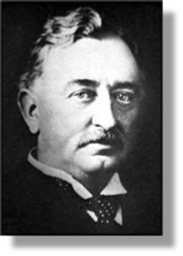 xxxxxThe fervent imperialist and diamond
magnate Cecil Rhodes spent most of his life in South Africa where,
as a statesman in the Cape Colony, he worked tirelessly to extend
British rule on the continent. Obsessed with the idea that only the
British were capable of bringing the light of civilisation to the
Dark Continent, he sought to establish British control over a swathe
of territory stretching from the Cape to Cairo -
xxxxxThe fervent imperialist and diamond
magnate Cecil Rhodes spent most of his life in South Africa where,
as a statesman in the Cape Colony, he worked tirelessly to extend
British rule on the continent. Obsessed with the idea that only the
British were capable of bringing the light of civilisation to the
Dark Continent, he sought to establish British control over a swathe
of territory stretching from the Cape to Cairo -
 xxxxxRhodes was born in Hertfordshire,
England, fifth son of the vicar of Bishops Stortford. He attended
the local grammar school, but at the age of 17, having suffered from
asthma from an early age, he was sent out to South Africa to benefit
from a warmer climate. For about year he worked with his brother
Herbert, who had a cotton farm in Natal, but in 1871, anxious to
make his own way in the world, he boarded an ox-
xxxxxRhodes was born in Hertfordshire,
England, fifth son of the vicar of Bishops Stortford. He attended
the local grammar school, but at the age of 17, having suffered from
asthma from an early age, he was sent out to South Africa to benefit
from a warmer climate. For about year he worked with his brother
Herbert, who had a cotton farm in Natal, but in 1871, anxious to
make his own way in the world, he boarded an ox-
xxxxxIn the
meantime, to further his commercial and colonial ambitions, Rhodes
entered the Cape legislature in 1881, and became prime minister
from 1890 to 1896. In home affairs he introduced agricultural
reforms in the Cape Colony, and gave the franchise to a limited
number of natives, based on wealth and educational qualification.
However, his Glen Grey Act of 1894, which set aside an area
exclusively for African development, was seen by many as a means
of entrenching white supremacy and, later, as the roots of a
policy of segregation (apartheid). But
it was colonial matters that occupied much of his thought. He was
a passionate believer in extending British control further north
and gaining from the mineral wealth this might well reveal. With
this in mind, and fearing that others -
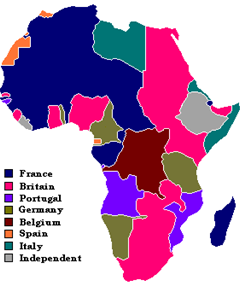 xxxxxAt one time, fervently
believing that the British Empire was the best means of civilising
Africa, he entertained the idea of establishing a continuous block
of British possessions from Cape Colony to Egypt (where the British
xxxxxAt one time, fervently
believing that the British Empire was the best means of civilising
Africa, he entertained the idea of establishing a continuous block
of British possessions from Cape Colony to Egypt (where the British
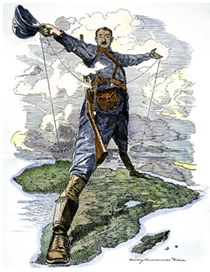 had
taken control in 1882), but this idea -
had
taken control in 1882), but this idea -
xxxxxBut whilst
Rhodes’ ambitious scheme for Africa was never achieved in full, he
nevertheless made enormous strides in expanding British control
over southern Africa, be it by fair means or foul. He played an
important role in gaining the annexation of Bechuanaland in 1884 -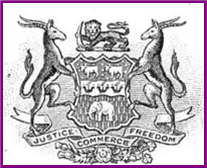 granting the company’s charter, the British government -
granting the company’s charter, the British government -
xxxxxIn 1890 he
persuaded Jameson to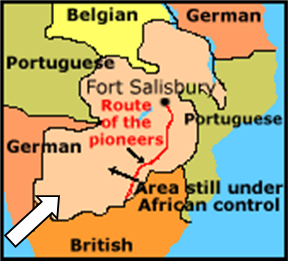 abandon his medical practice in Kimberley and join him in a
colonial enterprise. Following Rhodes’ instructions, he assembled
and led a pioneer column across Matabeleland and into Mashonaland
-
abandon his medical practice in Kimberley and join him in a
colonial enterprise. Following Rhodes’ instructions, he assembled
and led a pioneer column across Matabeleland and into Mashonaland
-
xxxxxBut triumph
was to be followed by disaster when, in 1895, he attempted to
overthrow Kruger and regain the Transvaal, a country which, as we
have seen, was lost to the British in the First Anglo-
xxxxxAs we shall
see the Jameson Raid, as it came to be called, ended in total
disaster on the second day of 1896. The insurrection in Johannesburg did not take place,
but Jameson, believing that his small force could trigger a
country-
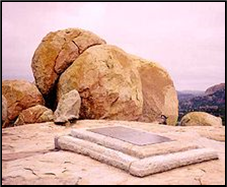
xxxxxThe raid
strained relations between Britain and Germany -
xxxxxRhodes was
a remarkable but strange mixture of a man. As a dreamer, his
vision of imposing British rule from the Cape to Cairo eventually
came to nought -
xxxxxIncidentally, today Rhodes is chiefly remembered for the Rhodes Scholarships, established under his will in 1902 and financed by a large proportion of his immense wealth. First introduced in 1903, over seventy scholarships are now awarded annually. Originally intended for young men from the British Empire, the United States and Germany, these offer two years of study at Oxford University. In compliance with Rhodes’ wishes, selection is based not only on scholastic attainment, but also on sporting prowess, moral standing and qualities of leadership. In 1976 the British Parliament gave women the right to apply for these scholarships. ……
xxxxx……xxThe last years of Rhodes’ life were somewhat soured by his association with an aristocratic adventuress named Princess Catherine Radziwill, a woman of Polish origin. Having declined to marry her, she forged a promissory note in his name. She was eventually found guilty of forgery and spent some time in a South African jail, but the affair aroused a great deal of scandal and caused him much embarrassment. ……
xxxxx……xxOn visits to South Africa, the English poet and writer Rudyard Kipling lived in a house provided by Rhodes. His friendship with the diamond magnate and statesman did much to influence his belief in the civilizing mission of the British Empire. ……
xxxxx……xxRhodes never achieved his dream of producing a string of British colonies from Egypt to the Cape Colony, but this was in fact realised for a brief time after the First World War when, in June 1918, the British took over the former German territory of Tanganyika. Four years later, however, Egypt gained its independence. As we shall see, a rival scheme by the French to link their colonies from west to east (Senegal to Djibouti) led to the Fashoda Incident of 1898. ……
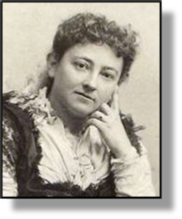 xxxxx…… Inx1897 the South African novelist Olive
Schreiner (1855-
xxxxx…… Inx1897 the South African novelist Olive
Schreiner (1855-
Vc-
xxxxxPaul Kruger (1825-
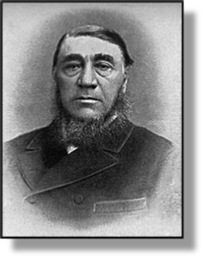 xxxxxPaul Kruger (1825-
xxxxxPaul Kruger (1825-
xxxxxKruger took
up farming as a young man, but he was set on being a soldier and
began his military service as a field cornet. In 1854 he was
appointed commandant of Rustenburg and, six years later, named the
commandant-
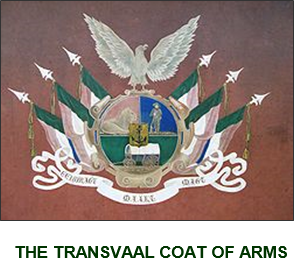 xxxxxIn 1883 he was appointed state president
and, re-
xxxxxIn 1883 he was appointed state president
and, re-

xxxxxIn South
Africa, the Jameson Raid united the Transvaal Boers behind
President Kruger, and led to a military pact with the Orange Free
State in 1897. Both republics built up the strength of their
armies, mostly from German factories. In May 1899 a conference at
Bloemfontein failed to reach an agreement over the position of the
Uitlanders, and in September the British colonial secretary Joseph
Chamberlain demanded full equality for British citizens living in
the Transvaal. Kruger then issued his own ultimatum, demanding
that British troops withdraw from Transvaal borders, and,
receiving no reply -
xxxxxKruger was too old to take an active part in the fighting, but as champion of his people he proved an inspiration to his fighting troops. In 1900 however, as British troops advanced on Pretoria, he left for Europe in a vain effort to summon up support for his country. He settled in Holland for the remainder of the war, and then moved to Clavens in Switzerland. It was there that he died in July 1904. His body was shipped to Cape Town and taken by train for burial in the Heroes Acre in the Church Street cemetery, Pretoria.
xxxxxIncidentally, on his appointment as president in 1883 Kruger made a visit to Europe, visiting Germany, Belgium, the Netherlands, France and Spain. In Germany he was invited to an imperial banquet where he met the Kaiser, Wilhelm I, and Chancellor Otto von Bismarck.
Including:
Paul Kruger



